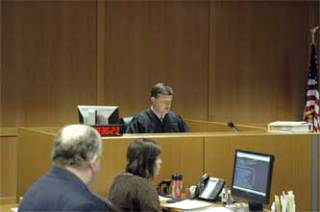MARYSVILLE — On this particular day, judging from the number of names called, there are about 20 or so cases on the docket of Marysville Municipal Court Judge Fred Gillings.
Gillings’ court is one of two in session on Aug. 26. A part-time commissioner is hearing cases in another courtroom next door. In Gillings’ courtroom, the calendar is set for initial arraignments.
Announcing he is serving as attorney of the day, the court’s Vance O’Dell begins calling names off the docket list, checking in defendants before Gillings enters the courtroom.
While he states he will not be acting as anyone’s attorney, O’Dell does serve as a sort of public defender, helping defendants maneuver through their cases after they meet with prosecutor Cheryl Beyer, who is a little late in arriving for the 8:30 a.m. court session.
According to O’Dell, the process for defendants works something like the following. They meet first with the prosecutor, who may or may not make an offer to settle their case, an offer known as a stipulation settlement.
“If they make an offer, take it,” O’Dell advises. “It might be the best you’ll see.”
O’Dell also tries to see to it each defendant signs a form explaining their rights. They also are invited to fill out an application for a public defender.
About 8:40 or so, Gillings enters the room. He makes some basic comments, urging defendants to sign the rights form, stating their cases cannot proceed unless they do. He then announces a recess, giving Beyer and O’Dell more time to meet with defendants. Beyer begins to call up those defendants and holds private conversations with each concerning their cases.
In many instances, defendants are offered stipulation settlements. They then move over to discuss those settlement offers with O’Dell. Most defendants seem calm as they speak with the two attorneys, though one woman flashes a little anger, while another is clearly close to tears.
After roughly half an hour, Gillings re-enters and the courtroom moves into high gear. Only two defendants have attorneys representing them and those cases are called first. In addition to his attorney, one defendant is accompanied by a court-provided Spanish translator who has been moving throughout the courtroom speaking with various defendants.
With his private attorney speaking for him, that first defendant pleads not guilty to a charge of DUI. His case is set for a jury trial. The second private attorney in the courtroom also enters a plea of not guilty on behalf of his client, charged with fourth degree assault. Another jury trial is set.
If those two cases actually reach that point, they will represent only the second and third jury trials held in the Marysville court this year.
As Gillings continues to call cases, defendants continue to move from talking with Beyer to talking with O’Dell. What soon becomes evident is the most common infraction on the docket that day is driving without a valid license. In most cases, Beyer recommends a $500 fine.
But also in most cases, the defendants can have that fine reduced to $250 if they return in 30 days with a valid license. The defendants don’t even have to come back to court, just present their licenses at the court’s front desk.
“There are not a lot of courts that offer fine reductions,” Gillings tells a defendant at one point. “I think we’re trying to help you here.”
As the license cases come before Gillings, he asks those defendants what is preventing them from obtaining a valid license. In most instances, they need to pay tickets in other jurisdictions. Gillings seems lenient if the tickets carry a large price tag and offers those defendants extra time, up to 60 days, to come back with a valid license and still earn a reduction in what they owe the Marysville court. Gillings seems especially gentle with the woman who appeared close to tears earlier.
“You seem like a nice person,” he remarks, describing her as just somebody caught in some bad circumstances and he wishes her luck in regaining her license.
At least through roughly the first half of the docket, perhaps the most serious case of the morning involves an alleged assault between a mother and daughter. The defendant mother pleads not guilty and asks Gillings about a no-contact order as she wants to avoid interaction with her minor daughter. Gillings says he can’t grant the order, stating the woman needs to seek a protection order against her daughter if that is what she wants.
In an interview prior to the court session, Gillings said dealing with the wide variety of people coming into the court is one of his biggest challenges. He added that in most cases, a municipal court case probably represents the most extensive contact the average person will have with the judicial system.
“Each person is an individual,” Gillings said. “You have to be very reactive to the people that are in front of you.”
He said he often tells nervous defendants to take a deep breath and assures them they will survive their five-minute hearing before the court.



